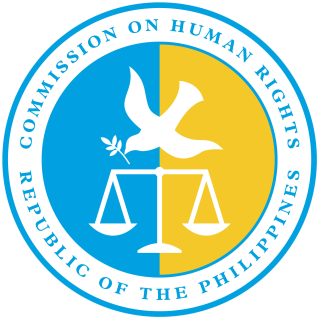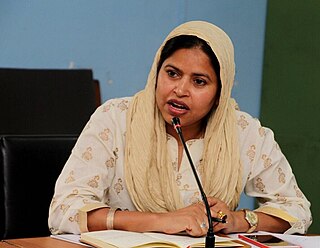
The politics of Nepal function within a framework of a republic with a multi-party system. Currently, the position of President of Nepal is occupied by Vidhya Devi Bhandari. The position of Prime Minister is held by Khadga Prasad Oli. Executive power is exercised by the Prime Minister and his cabinet, while legislative power is vested in the Parliament.

The Nepalese Civil War, known popularly as the Maoist Conflict, Maoist Insurgency or Maoist Revolution, was a ten-year-long armed conflict between the Communist Party of Nepal (Maoist) (CPN-M) and the government of Nepal, fought from 1996 to 2006. The insurgency period was popularly known as Maovadi Dwandakaal in Nepal. The rebellion was launched by the CPN-M on 13 February 1996 with the main aim of overthrowing the Nepalese monarchy and establishing a People's Republic. It ended with the Comprehensive Peace Accord signed on 21 November 2006. The conflict was characterized by lynchings, massacres, purges, captures and autonomous rule, spread of communist teachings, conflicts against the authority and crimes against humanity. The revolution resulted in deaths of over 17,000 people involving civilians, insurgents, army and police personnels, and internally displaced hundreds of thousands of people. This revolution succeeded in overthrowing the 240 years old Hindu Shah monarchy of Gorkha and established secular republican regime which resulted in political, social and cultural change in Nepal popularly termed Krambhanga.
Human rights defenders or human rights activists are people who, individually or with others, act to promote or protect human rights. They can be journalists, environmentalists, whistle-blowers, trade unionists, lawyers, teachers, housing campaigners, and so on. They can defend rights as part of their jobs or in a voluntary capacity. As a result of their activities, they can sometimes be the subject of reprisals and attacks of all kinds, including smears, surveillance, harassment, false charges, arbitrary detention, restrictions on the right to freedom of association, and physical attacks.
Human rights in Bangladesh are enshrined as fundamental rights in Part III of the Constitution of Bangladesh. However, constitutional and legal experts believe many of the country's laws require reform to enforce fundamental rights and reflect democratic values of the 21st century. Proposed reforms include strengthening parliamentary supremacy, judicial independence, the separation of powers, repealing laws which restrain freedom of the press and disbanding security agencies which violate civil liberties.

Constitution of Nepal 2015 is the present governing Constitution of Nepal. Nepal is governed according to the Constitution which came into effect on Sept 20, 2015, replacing the Interim Constitution of 2007. The constitution of Nepal is divided into 35 parts, 308 Articles and 9 Schedules.

The Commission on Human Rights (CHR) is an independent constitutional office created under the 1987 Constitution of the Philippines, with the primary function of investigating all forms of human rights violations involving civil and political rights in the Philippines.
Sapana Pradhan Malla is a Nepalese Supreme Court Judge and member of the Nepalese Constituent Assembly. She is a former president of the Forum for Women, Law & Development. In 2008, she was a joint winner of the Gruber Prize for Women’s Rights. Born in Nawalparasi district, Pradhan has a master's degree in Comparative Law from the University of Delhi. She was selected as Nepal’s candidate for the Convention for the Elimination of Discrimination Against Women’s (Cedaw) 2015-2018 term, but did not secure enough votes. She also has a Mid Career Master from Harvard Kennedy School of Government. She has been appointed as member of the Committee Against Torture (CAT) 2014-2017 term.
The National Human Rights Commission (NHRC) of Nepal is an independent and autonomous constitutional body. It was established in the year 2000 as a statutory body under the Human Rights Commission Act 1997. The Interim Constitution of Nepal 2007 made the NHRC a constitutional body. It has a separate sphere of responsibilities in the constitutional legal system of the country. These responsibilities complement the responsibilities of the normal machinery of the administration of Justice, the Supreme Court, the Office of the Attorney General, the Commission for the Investigation of Abuse of Authority, and other existing executive, quasi-judicial or judicial bodies of Nepal.
General Rookmangud Katawal is a former Nepalese Army General, who served as the Chief of Army Staff of the Nepal Army from September 10, 2006 to August, 2009. General Katawal had come into controversy after the then Prime Minister Pushpa Kamal Dahal (Prachanda) had unilaterally decided to "relieve" Katawal of his duties on May 3, 2009
Women's representation in the Parliament of Nepal has increased in the Constituent Assembly, which may affect the drafting of the future constitution of Nepal.

Capital punishment in Nepal has been abolished.
Krishna Sen (Ichhuk) was a Nepalese journalist.
Nepal, a Himalayan country situated in South Asia, is one of the poorest countries of the world. It has suffered from political instability and undemocratic rule for much of its history. There is a lack of access to basic services, people have superstitious beliefs, and there is gender discrimination. Although the Constitution provides protections for women, including equal pay for equal work, the Government has not taken significant action to implement its provisions.
The Commission of Inquiry to Locate the Persons Disappeared during the Panchayat Period (1990-1991) is a truth commission established in Nepal in 1990 after the end of the autocratic Panchayat Regime by the first post-Panchayat Prime Minister Krishna Prasad Bhattharai. The commission was set up to examine allegations of human rights violations and inquire about enforced disappearances during the Panchayat system from 1961 to 1990.
Migrant workers in the Persian Gulf region involves the prevalence of migrant workers in the Kingdom of Bahrain, the State of Kuwait, the Sultanate of Oman, the State of Qatar, the Kingdom of Saudi Arabia and the State of the United Arab Emirates (UAE). Together, these six countries form the Gulf Cooperation Council (GCC), established in 1981. The GCC cooperates on issues related to economy and politics, and the subject of migrant workers constitutes a substantial part of the council's collaboration. All of the GCC countries are dependent on migrant labor to bolster and stimulate economic growth and development, as the GCC countries possess an abundance of capital while the domestic labor capacity is low. Although migrant workers in the Persian Gulf region amount to no more than 10% of all migrants worldwide, they constitute a significant part of the populations of their host countries.

Mohna Ansari is a member of National Human Rights Commission of Nepal. She was appointed to this position in October 2014. She is a well-known rights activist, and Nepal's only female attorney from the Muslim community. She worked as a commissioner at the National Women Commission (NWC) of Nepal between 2010 and 2014. She then worked as the Senior Advisor of IDEA International.

In 2015, Nepal introduced constitutional recognition for "gender and sexual minorities". Despite this, the rights situation of intersex people in Nepal is unclear. Local activists have identified human rights violations, including significant gaps in protection of rights to physical integrity and bodily autonomy, and protection from discrimination. A first national meeting of intersex people look place in early 2016, with support from the UNDP.

Terai Human Rights Defenders Alliance is a non-governmental human rights organization working for promotion and protection of human rights and human rights defenders in Nepal, with special focus in Terai region. It monitors, investigates, documents and researches on torture, extrajudicial execution, arbitrary arrest and detention, citizenship, inclusion and caste-based discrimination among other human rights issues in the Terai.

Dipendra Jha is the first and incumbent chief attorney of Province 2, one of seven provinces of Nepal. He assumed the office in February 2018. He is the legal adviser to the Chief Minister Lalbabu Raut and the Convener of Bill Drafting Facilitation Committee in Province 2. Article 160 (5) of the Constitution stipulates: "The Chief Attorney shall be the chief legal advisor to the State Government. It shall be the duty of the Chief Attorney to give opinions and advices on constitutional and legal matters to the State Government and such other authorities as the State Government may specify."
Madhesi conflict is an ongoing ethnic conflict between the Madhesi group and the state of Nepal. The Madhesi population, according to the population consensus of 2011, comprised about 35.9% of the total Nepalese population. Despite their significant representation in the country's population, the Madhesis have been subjected to political, economic, and social discrimination.









